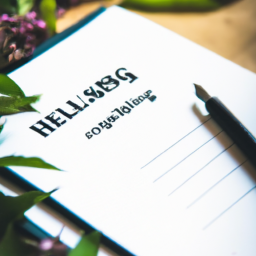Are you feeling overwhelmed and unsure about how to heal yourself and your relationship? We understand that navigating the complexities of personal growth and maintaining a healthy partnership can be challenging. In this blog post, we will provide you with valuable self-help tips that can aid in healing both yourself and your relationship. Whether you’re seeking ways to improve your emotional well-being or looking to foster a stronger connection with your partner, we’re here to offer guidance and support. Let’s explore effective strategies that can empower you to embark on a journey of healing and growth.
The Importance of Self-Healing in Relationships
Understanding the Power of Self-Healing
Relationships can be both beautiful and challenging. They require effort, understanding, and constant nurturing to thrive. However, often we tend to overlook the importance of self-healing in the context of relationships. Self-healing is the process of taking care of ourselves emotionally, mentally, and physically to create a strong foundation for a healthy relationship.
When we prioritize self-healing, we are better equipped to handle the ups and downs of a relationship. It allows us to become more self-aware, understand our needs and triggers, and develop the necessary tools to address them effectively. By healing ourselves, we can break negative patterns, improve communication, and foster a deeper connection with our partner.
Self-healing is not a selfish act, but rather an act of self-love and self-care. It enables us to show up as our best selves in a relationship, bringing more love, compassion, and understanding to the table. By taking responsibility for our own healing, we can create a positive ripple effect that enhances the overall health and happiness of the relationship.
Identifying Areas for Self-Healing
Before diving into the process of self-healing, it is essential to identify the areas that require attention. Reflect on your emotions, past experiences, and patterns that may be affecting your relationship. Are there unresolved traumas or wounds that need healing? Are there any negative beliefs or self-sabotaging behaviors that are hindering your growth?
Self-reflection and introspection are key in this process. Consider seeking professional help or engaging in therapeutic practices such as journaling, meditation, or counseling to gain deeper insights into yourself. By understanding the root causes of your emotional triggers and behaviors, you can begin the journey of self-healing.
Remember, self-healing is an ongoing process, and it requires patience and commitment. Be gentle with yourself and allow yourself the time and space to heal and grow.
Practical Steps for Self-Healing
1. Prioritize Self-Care
Self-care is the foundation of self-healing. Make it a priority to take care of your physical, emotional, and mental well-being. Engage in activities that bring you joy and peace. Practice regular exercise, eat nourishing foods, get enough sleep, and set aside time for relaxation and self-reflection. Remember, you cannot pour from an empty cup, so fill yourself up first.
2. Cultivate Self-Awareness
Developing self-awareness is crucial in understanding your thoughts, emotions, and behaviors. Pay attention to your inner dialogue and notice any negative self-talk or limiting beliefs. Challenge those beliefs and replace them with positive affirmations. Journaling can be a powerful tool in gaining self-awareness and uncovering hidden patterns or triggers.
3. Practice Emotional Healing
Emotional healing involves acknowledging and processing your emotions in a healthy way. Allow yourself to feel and express your emotions without judgment. Seek support from loved ones or professionals if needed. Engage in activities such as therapy, breathwork, or meditation to release any emotional baggage and cultivate emotional resilience.
The Transformative Power of Self-Healing in Relationships
When both partners commit to their individual self-healing journeys, the relationship can experience profound transformations. By healing ourselves, we become more compassionate, understanding, and empathetic towards our partner’s struggles and needs. We learn to communicate effectively, set healthy boundaries, and resolve conflicts in a constructive manner.
Self-healing also allows us to break free from toxic relationship patterns and create healthier dynamics. We become less reliant on our partner for validation and fulfillment, as we learn to find happiness and fulfillment within ourselves. This newfound independence and self-love can strengthen the bond between partners and foster a more balanced and fulfilling relationship.
Remember, self-healing is a continuous journey. As individuals, we are constantly evolving, and so are our relationships. By prioritizing self-healing, we create a solid foundation for growth, love, and harmony in our relationships.

Effective Strategies for Healing Yourself and Your Relationship
Understanding the Importance of Self-Healing
Healing yourself is a crucial step towards building a healthy and fulfilling relationship. It involves taking responsibility for your own emotional well-being and working on personal growth. By focusing on self-healing, you can develop a stronger sense of self, improve your communication skills, and cultivate empathy towards your partner. Here are some effective strategies to help you heal yourself and enhance your relationship:
First and foremost, it’s important to acknowledge and accept your emotions. Understand that healing is a process, and it’s okay to feel a range of emotions, including pain, anger, and sadness. Allow yourself to experience these emotions fully, without judgment or suppression. By embracing your emotions, you can begin the healing process and gain a deeper understanding of yourself.
Secondly, practice self-reflection. Take the time to explore your thoughts, beliefs, and behaviors that may be contributing to any emotional wounds or conflicts in your relationship. Self-reflection allows you to gain insight into your own patterns and triggers, enabling you to make positive changes. Consider keeping a journal or seeking professional guidance to facilitate this process.
Lastly, prioritize self-care. Engage in activities that bring you joy, relaxation, and fulfillment. This could include exercise, meditation, spending time in nature, or pursuing hobbies and interests. Taking care of your physical, mental, and emotional well-being is essential for healing and maintaining a healthy relationship.
Building Effective Communication Skills
Communication is the foundation of any successful relationship. To heal yourself and enhance your relationship, it’s crucial to develop effective communication skills. Here are some strategies to improve your communication:
Firstly, practice active listening. Give your partner your full attention and strive to understand their perspective without interrupting or judging. Validate their feelings and let them know that you genuinely care about their thoughts and emotions. Active listening fosters trust, empathy, and open dialogue.
Secondly, express yourself assertively and honestly. Clearly communicate your thoughts, needs, and boundaries while being respectful of your partner’s perspective. Use “I” statements to express your feelings and avoid blaming or criticizing. Honest and assertive communication promotes understanding and helps resolve conflicts.
Lastly, practice empathy. Put yourself in your partner’s shoes and try to understand their experiences, emotions, and struggles. Show compassion and support, even when you may not fully agree. Empathy allows for deeper connections and helps foster a safe and nurturing environment for healing and growth.
Cultivating Emotional Intimacy
Emotional intimacy is the foundation of a strong and healthy relationship. To heal yourself and enhance your relationship, it’s important to cultivate emotional intimacy. Here are some strategies to foster emotional intimacy:
Firstly, be vulnerable and open with your partner. Share your fears, dreams, and insecurities. Allow yourself to be seen and heard without fear of judgment or rejection. Vulnerability creates a deeper emotional connection and allows for mutual healing and growth.
Secondly, prioritize quality time together. Set aside dedicated time for meaningful conversations, shared activities, and bonding experiences. Disconnect from distractions such as phones or television and focus on each other. Quality time fosters emotional connection and strengthens the bond between partners.
Lastly, practice forgiveness and let go of past hurts. Holding onto grudges or resentments can hinder healing and prevent emotional intimacy. Work on forgiving yourself and your partner for past mistakes and focus on the present moment. Forgiveness allows for healing and paves the way for a brighter future together.
Remember, healing yourself is an ongoing journey that requires patience, self-compassion, and commitment. By implementing these strategies and prioritizing self-healing, you can not only improve your own well-being but also nurture a deeper and more fulfilling relationship with your partner.

Self-Help Tips for Nurturing and Strengthening Relationships
Introduction
Building and maintaining healthy relationships is essential for our overall well-being and happiness. Whether it’s a romantic partnership, a friendship, or a family bond, relationships require effort, understanding, and continuous nurturing. In this article, we will explore self-help tips that can help you heal yourself and strengthen your relationships.
Understanding Yourself
Before we can effectively nurture our relationships, it is crucial to understand ourselves. Self-awareness is the foundation of personal growth and healthy connections with others. Take time to reflect on your emotions, beliefs, and values. Understand your strengths and areas for improvement. This self-reflection will enable you to communicate your needs and boundaries effectively.
Additionally, practicing self-care is vital for your well-being. Engage in activities that bring you joy and relaxation. Prioritize your physical and mental health. When you take care of yourself, you are better equipped to contribute positively to your relationships.
Lastly, be compassionate towards yourself. Acknowledge that healing and growth are processes that take time. Embrace self-forgiveness and learn from your past experiences. By cultivating self-compassion, you can create a safe and loving space within yourself, which will positively impact your relationships.
Effective Communication
Communication is the cornerstone of any successful relationship. To nurture and strengthen your connections, it is crucial to develop effective communication skills.
Firstly, practice active listening. Give your full attention to the person speaking, without interrupting or formulating your response in your mind. Validate their feelings and thoughts, even if you disagree. This fosters a sense of trust and openness.
Secondly, express yourself honestly and assertively. Clearly communicate your needs, emotions, and boundaries. Use “I” statements to avoid blaming or criticizing the other person. Effective communication involves both speaking and listening, so encourage open dialogue and encourage the other person to express themselves as well.
Lastly, remember that non-verbal communication is just as important as verbal communication. Pay attention to your body language, facial expressions, and tone of voice. Be mindful of how you are coming across and make adjustments if necessary.
Emotional Intelligence
Emotional intelligence plays a significant role in healing yourself and nurturing your relationships. It involves understanding and managing your emotions and empathizing with others.
Start by developing self-awareness of your emotions. Notice how you feel in different situations and learn to regulate your emotions effectively. This will prevent impulsive reactions and allow you to respond thoughtfully.
Empathy is another crucial aspect of emotional intelligence. Put yourself in the other person’s shoes and try to understand their perspective. Validate their emotions and show genuine compassion. This fosters connection and deepens your bond with them.
Lastly, practice emotional resilience. Life is full of challenges, and relationships are not exempt from difficulties. Develop coping mechanisms to handle stress and conflicts constructively. Build resilience by seeking support from loved ones, engaging in self-care, and cultivating a positive mindset.
Conclusion
Nurturing and strengthening relationships is a continuous journey that requires self-reflection, effective communication, and emotional intelligence. By understanding yourself, practicing active listening, expressing yourself assertively, and developing emotional intelligence, you can heal yourself and create fulfilling connections with others. Remember, healthy relationships are built on trust, respect, and genuine care.
Here are the Essential Points
In our journey through life, we often encounter challenges that can take a toll on our emotional well-being and relationships. It is not uncommon to find ourselves feeling lost, disconnected, or struggling to maintain a healthy bond with our loved ones. However, there is hope for healing and improving both ourselves and our relationships. By taking the time to focus on self-help and implementing a few key strategies, we can begin to mend the wounds and foster a more harmonious connection.
Self-reflection is a powerful tool in healing ourselves and our relationships. By taking a step back and examining our own thoughts, emotions, and behaviors, we can gain valuable insights into the root causes of our struggles. This process requires honesty and vulnerability, as we must confront our own shortcomings and take responsibility for our actions. It is important to approach this self-reflection with compassion and empathy, understanding that we are all imperfect beings who make mistakes. By acknowledging our own flaws, we can begin to make positive changes and grow as individuals.
In addition to self-reflection, effective communication is crucial in healing and strengthening our relationships. Open and honest dialogue allows for the expression of emotions, concerns, and needs, creating a safe space for both parties to be heard and understood. Active listening is an essential component of effective communication, as it shows respect and validates the other person’s feelings. By truly listening to our partner or loved one, we can build trust and foster a deeper connection.
Healing ourselves and our relationships is a journey that requires patience, effort, and a commitment to personal growth. By embracing self-help strategies such as self-reflection and effective communication, we can begin to heal the wounds and cultivate stronger, more fulfilling relationships. Remember, it is never too late to start the healing process and create a brighter, more harmonious future.
Frequently Asked Questions (FAQ):
Q1: How can I heal myself and improve my relationship?
A1: We understand that healing yourself and your relationship can be a challenging journey. To start, it’s important to focus on self-care and self-reflection. Take time to understand your own needs, emotions, and triggers. Engage in activities that bring you joy and help you relax. Communicate openly and honestly with your partner, expressing your feelings and listening to theirs. Seek professional help if needed, such as therapy or counseling, to gain valuable insights and tools for growth.
Q2: What are some self-help tips for improving communication in a relationship?
A2: Communication is vital for a healthy relationship. Start by actively listening to your partner, giving them your undivided attention and validating their feelings. Use “I” statements to express your own emotions and needs, rather than blaming or criticizing. Practice empathy and try to see things from your partner’s perspective. Set aside dedicated time for open and honest conversations, free from distractions. Remember, effective communication takes practice and patience, but it can greatly enhance your relationship.
Q3: How can I rebuild trust in my relationship after a difficult period?
A3: Rebuilding trust takes time and effort from both partners. Begin by acknowledging the pain and hurt caused by the difficult period. Communicate openly about your feelings and concerns, allowing space for your partner to do the same. Be consistent in your actions and follow through on your commitments. Practice forgiveness, understanding that it is a process. Seek professional guidance if necessary to navigate the complexities of rebuilding trust. With patience and dedication, trust can be restored.
Q4: What self-help techniques can I use to manage stress and improve my well-being?
A4: Stress management is crucial for your overall well-being. Start by identifying the sources of stress in your life and finding healthy coping mechanisms. Engage in regular exercise, which can help reduce stress and boost your mood. Practice relaxation techniques like deep breathing, meditation, or yoga. Prioritize self-care activities that bring you joy, such as reading, painting, or spending time in nature. Set boundaries and learn to say no when necessary. Remember, taking care of yourself is essential for a healthy relationship.
Q5: How can I cultivate a positive mindset to enhance my relationship?
A5: Cultivating a positive mindset can have a significant impact on your relationship. Start by practicing gratitude, focusing on the positives in your partner and your relationship. Challenge negative thoughts and replace them with more constructive ones. Engage in activities that bring you joy and foster positivity. Celebrate small victories and milestones together. Practice forgiveness and let go of past resentments. Surround yourself with supportive and positive influences. By nurturing a positive mindset, you can create a more fulfilling and harmonious relationship.



